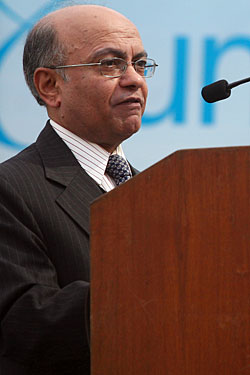 |
States often crave recognition. A visit by a leader of a more powerful state; a seat at the high table; an invitation to a summit; or an appointment in the global governance structure are all essentially symbolic � considered important by those who make it their business to conduct diplomacy. But why the Nepali state, or the earlier Madhav Nepal-led government to be more precise, thought it useful and necessary to back Kul Chandra Gautam in the UNGA presidential race at this juncture defies rational calculation.
There are essentially two arguments made by those who have been at the forefront of backing Gautam � it is Nepal's turn, and Gautam is the best candidate Nepal could ever have.
Nepal is an old member of the UN; it has contributed a lot to peace keeping operations; and this is our chance to be recognised. All of this is factually true. But it is important to demystify this business about our 'contribution' and our 'chance'.
The UN needs us and our armed personnel put themselves at risk to keep the peace in distant lands. But peacekeeping is a mutually beneficial relationship. It is among the relatively low-risk, high-return options involving military operations. And for the Nepal Army, it is a crucial safety valve that goes a long way in addressing the growing aspirations of officers and soldiers. It adds to the financial muscle of the military, and it exposes our forces to military practices outside our borders, making them more professional. No one is doing the other a favour here.
But let us, for a moment, stick to the conventional parameter of seeing peacekeeping as Nepal's contribution. Aren't there other ways we could use that 'bargaining chip' to extract more than a UNGA presidency? Could we have used our claims of not having been represented to get a position in other bodies, or additional resources, which would have a tangible benefit for the Nepali people? And at a time of deep domestic crisis, is claiming the UNGA presidency really a national priority? In this case, the state invests scarce political capital and resources in the race, but only the individual benefits. He can do little to use the position for Nepal's benefit, except by giving a sense of 'pride' to a few in the diaspora and a few of his friends back in Nepal.
And that brings us to Kul Chandra Gautam.
Gautam is a pleasant man, humble and polite with all irrespective of hierarchy. He was a successful international professional, and in a Nepal starved of icons, a section of the media played an instrumental role in portraying him as the pinnacle of Nepal's achievement globally.
Since Gautam's return to Nepal, he has wanted to contribute to national affairs. This is laudable indeed, but the other way to put it is that he has yearned for a formal role. There was a campaign, which he did not inspire but was taken in by, to elect him as Nepal's first president. The Kathmandu grapevine was then rife with rumours about his interest in heading a Peace and Reconstruction Commission, or being ambassador at large. Whether true or not, what was clear was his desire to cosy up to the powers that be. Just read his speeches introducing Pushpa Kamal Dahal in New York on different platforms, or look at the photographs where he almost looks like a supplicant to the Maoist supremo. But the politics here are more relevant than the person.
When Dahal resigned, Gautam was quick off the mark to praise the president's action and hailed Ram Baran Yadav as the best thing to have happened to Nepali politics. He played a distinctly partisan role in the polarisation in 2009-10, being one of the Madhav Nepal government's key cheerleaders. He was also consulting and presenting papers on integration at conferences organised by an NGO, headed by PM Nepal's foreign policy advisor. All of this obviously helped him build a political relationship with those at the helm of the Nepali state since May 2009. The government backed his nomination, and he was then appointed as an advisor to the PM to shore up his status. These details are important because it gives us the background to understand the political quid pro quo behind the nomination, and why the country is investing resources in this case.
Irrespective of whether Kul Chandra Gautam succeeds in adding another designation to his CV, there is little Nepal will gain out of this exercise.
READ ALSO:
No safe ground, EDITORIAL
The war's not over yet, DAMAKANT JAYSHI



